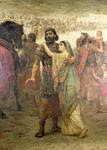J.S. Bach as a matchless statement of Trinitarian faith
Today I attended the funeral of Ian Cundy, Bishop of Peterborough. It was a grand and solemn occasion but a very beautiful and moving one. Ian planned the service in detail and wrote the introduction which began, 'I invite you in this service to contemplate the mystery of God, in the light of which I have sought to live my life and understand its meaning.'
He went on to write, 'Music has always been an important part of my journey, and it is through music as well as word and sacrament that I invite you to encounter the mystery of the divine presence among us.'
The music for the Eucharist was taken from the Missa Brevis by Mozart; there was a setting of George Herbert by Vaughan Williams; and of John Donne by William Harris. Following the Dismissal, John Tavener's Funeral Ikos was sung while the congregation remained standing. And then we sat for J.S. Bach's Fugue in E flat (St Anne) BWV 552(ii). In the introduction, Ian had written, 'And finally we move to one of J.S. Bach's matchless statements of Trinitarian faith - a piece which I invited generations of theological students to hear alongside the classic statements of Irenaeus and Augustine (among others) as plumbing the mystery of that most central of Christian insights - the doctrine of the Trinity.' And it was just that!
My first encounter with Ian was through a Scripture Union Bible Study Commentary on Ephesians - 2 Thessalonians, which I still have, and it was fitting that the first Scripture reading was from Ephesians 1. My second encounter was when he visited Rye as the Bishop of Lewes. I recall him saying that the unity of the Church was both a given, and something to be worked at, and since then I have used that statement repeatedly.


Comments